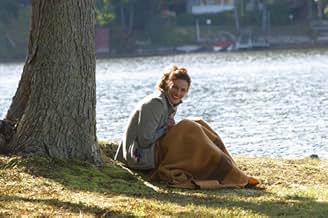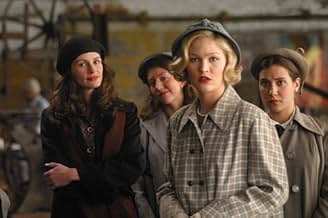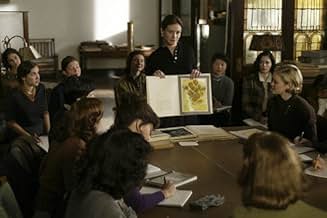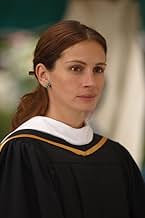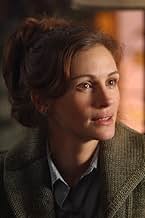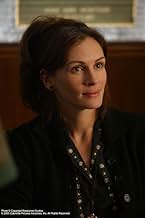En 1953, Katherine Watson, une jeune femme libre d'esprit, fraîchement diplômée de l'université de Bekerley, intègre la prestigieuse école pour filles de Wellesley pour enseigner l'histoire ... Tout lireEn 1953, Katherine Watson, une jeune femme libre d'esprit, fraîchement diplômée de l'université de Bekerley, intègre la prestigieuse école pour filles de Wellesley pour enseigner l'histoire de l'art.En 1953, Katherine Watson, une jeune femme libre d'esprit, fraîchement diplômée de l'université de Bekerley, intègre la prestigieuse école pour filles de Wellesley pour enseigner l'histoire de l'art.
- Réalisation
- Scénario
- Casting principal
- Récompenses
- 6 nominations au total
Avis à la une
Some reviewers on this site claim the movie has a liberal agenda. Well, if its liberal to want young ladies to consider all their options and be able to reach for the stars - if they choose, then who can disagree. Label me with an "L".
Recent movies that I will watch again include Groundhog Day, In America, The Emperor's Club, and In & Out. If you liked most of these, watch this movie.
You won't be disappointed. And be sure to watch the credits at the end, the part done to the song "The Heart of Every Girl." The older generation will really relate.
On the first day, her class fails under the leadership of the arrogant Betty Warren (Kirsten Dunst) and her friends Joan Brandwyn (Julia Stiles) and Giselle Levy (Maggie Gyllenhaal), but Katherine is advised by her mates and the Italian teacher Bill Dunbar (Dominic West) to not fear the students. Soon Katherine learns that the girls are only waiting to catch Mr. Nice Guy and get married and she fights against the status- quo of Wellesley and to keep her independence.
"Mona Lisa Smile" is an entertaining movie about a woman living ahead of time in a conservative environment. The performances are top-notch, highlighting Julia Roberts, Kirsten Dunst, Julia Stiles and Maggie Gyllenhaal. I bought this DVD many years ago and only today I have seen this movie recommended by a friend of mine. My vote is seven.
Title (Brazil): "O Sorriso de Mona Lisa" ("The Smile of Mona Lisa")
But the film does not focus only on the revolutionary teacher, but on a group of four friends who are so different that at times their relationships are not the happiest. We can follow the trajectories of some of these students. Betty Warren (Kirsten Dunst) initially adheres to society's traditional expectations and has a narrow view of the role of women at the time. She aspires to a conventional marriage and a traditional home life. However, as the story unfolds, Betty undergoes a transformation and begins to question her own beliefs and desires, thanks to Katherine's influence and the discoveries she makes about herself; Joan Brandwyn (Julia Stiles) is a talented and ambitious student at Wellesley who dreams of becoming a lawyer. She faces challenges as social and family expectations pressure her to marry and follow a more conventional path. Joan is inspired by Katherine's attitude and her quest for independence, which encourages her to follow her own dreams and challenge established conventions; Giselle Levy (Maggie Gyllenhaal) is an outgoing and daring student who openly defies social and academic norms. She is a rebellious figure, facing punishment and judgment for her "inappropriate" behavior. Giselle sees Katherine as a mentor and support figure who encourages her to embrace her authenticity and explore her non-standard interests; Connie Baker (Ginnifer Goodwin) is a shy and insecure young woman struggling to find her own voice. She is influenced by Katherine to overcome her lack of confidence and believe in her intellectual abilities. Throughout the film, Connie gains courage to voice her opinions and realizes her potential as a student and woman.
With the end of the War and the return of men to their "pre-established places" socially, a new campaign begins for women to return to their "place" in society, the home. But things weren't the same anymore and neither were women. Some wanted to continue working and already harbored ideas of independence, the speeches convincing them to return home and dedicate themselves to marriage were not efficient for all. For this reason, a campaign was started in favor of marriage and motherhood as a "true female vocation". Some more libertarian means of the media or women preached the possibility of reconciling marriage with a career, which for middle-class women, raised and educated in the best schools, seemed an insult. The 1950s, in addition to printing these discourses about a "feminine essence" focused on home and motherhood, which are against the remnants of the so-called "first wave" of feminism, which began in the 19th century and lasted until the beginning of the In the 20th century (according to some historians) the tensions that took place in that decade point to the perception of how the liberation discourses of women from patriarchy, on the one hand, and the moral appeal of institutions to their "submissive nature" on the other, make the "second wave" of feminism comes with new reflections and discourses for "women", such as their insertion in politics.
"Mona Lisa Smile" also touches on a variety of relevant and complex themes that reflect the society of the time and are still relevant today. Here are some of the main themes explored in the film: Role of Women in Society: A central theme of the film is the role of women in 1950s society. The story takes place in an all-female educational institution where traditional expectations for women were predominantly oriented toward marriage and motherhood. The film questions these social norms, featuring female characters who want more than just to fit these expectations, seeking their own identity and personal fulfillment; Education and Empowerment: The transformative power of education is a central theme in the film. Katherine Watson's character, as an art history professor, seeks to challenge and inspire her students to think critically, question established norms, and pursue a life of authenticity and purpose. Through knowledge and questioning, students are encouraged to find their own voices and become independent and empowered women.
The issue of Conformity and Rebellion is also addressed: The film explores the balance between social conformity and individual rebelliousness. The characters face the challenge of fitting into society's expectations, while at the same time wanting to follow their own paths. They must deal with the inner conflict between the desire to conform and the need to express their individuality and follow their own dreams; Sexuality and Freedom: The theme of sexuality is approached in a subtle but significant way in the film. Some characters question the idea that marriage is the only acceptable way to express female sexuality. They explore their own passions and desires, challenging society's conservative expectations and seeking a sexually satisfying and authentic life; Ambition and Autonomy: The film also explores the quest for personal ambition and women's struggle for autonomy and professional fulfillment. The characters face the dilemma of balancing their personal ambitions with social and family pressures. They face obstacles and challenges in pursuing their individual careers and desires, but find the strength and determination to persevere and fight for their own achievements.
At one point, while showing his second class, he puts on a work of art considered grotesque by one of the students. When questioned, she replies, "No, it's not! Is it not a good work? Hmm? Come on girls, there are no books telling you what to think, so it's not that easy, correct? Still in this dialogue, the student confronts the teacher, pointing out that "art is only art until the right people say it is". Excited by the challenging debate, the teacher responds: "And who are these people?". The scene described above is perhaps one of the best in the film with regard to the didactic aspects of the work. Another striking scene is in the section in which the students move to the studio to carry out a workshop with Van Gogh's works in boxes. The teacher talks about the possibility of popularizing art with the process of technical reproducibility.
In the technical aspects, what really deserves a special mention is Mike Newell's impeccable direction. He manages to give new life to a real story, which is the way women were seen. Anastas N. Michos' cinematography plays a key role in creating the film's atmosphere. Colors are carefully chosen to convey a sense of a specific era, with a cooler palette and muted tones, underscoring the melancholy, conservative atmosphere of the 1950s. Lighting is also used effectively to create contrast and emphasize the characters' emotions, as in the scenes where Katherine is teaching her students, where the light focuses on her, highlighting her presence and authority. The work of production and art direction, led by Jeannine Oppewall and Andrew M. Stearn, is exceptional. The sets and costumes are detailed and authentic, accurately recreating the environments of the era. Locations, such as Wellesley College and the interiors of the houses, are richly decorated and help to contextualize the story and characters. The production design contributes to the public's immersion in the portrayed period, with attention to the smallest details, from furniture to scene props.
The costumes created by Catherine Marie Thomas are elegant and accurately represent the style of the period. The female characters' clothing reflects the norms and expectations of 1950s society, with elegant dresses, skirts and classic hairstyles. The costumes also help convey the characters' transformations throughout the film, reflecting their internal changes and their search for authenticity. Mick Audsley's editing is deft in creating a fluid and coherent rhythm. The transition between scenes is smooth and the montage is well balanced, allowing the story to unfold cohesively. And Rachel Portman's score perfectly complements the film's emotional tone. Composed of delicate and melodic pieces, the music emphasizes the most emotional scenes and highlights the personal journey of the characters. The soundtrack contributes to the romantic and melancholy atmosphere of the film, accentuating the emotions and conflicts of the characters.
The film's maxim lies in the problem it addresses and the message it conveys, which were demonstrated with great care in all aspects; Dunst's character asks a good question, giving the example of the Mona Lisa, "she's smiling, but is she happy? ". In addition, we have a very exciting ending that runs away from any clichés. "Mona Lisa Smile" can be appreciated by all those who have the slightest interest in knowing what it was like at the time when only the male voice was heard, or who would like to appreciate good performances.
But...
"The devil is in the details," as they say, and this picture has just enough surprises, just enough charm, just enough fine acting to make it worth watching. Movies do not have to be real to be worthwhile, they just have to be about real things. The questions "Mona Lisa Smile" covers are still very much with us, and may provoke considerable discussion in your house. This film is respectful enough of its subject matter and well-enough executed to make it a much better way to spend your time than most of what's out there now. Don't believe the sourpusses, this one's a good'un.
Another thing that pleased me was the film's assumption of an intelligent, educated audience that does not require any dumbing-down of art and culture. "Mona Lisa Smile" rattles off names of artists and their works as if it fully expected moviegoers to be conversant with them. In at least one case, the film names neither the artist nor the work (Picasso's "Demoiselles d'Avignon"). All of these things are taken as givens, as part and parcel of a sophisticated audience's cultural baggage -- quite a change from the usual pap that Hollywood spoonfeeds us!
Moreover, the film sometimes speaks volumes by what it doesn't say but simply shows, taking for granted that we will fill in the blanks from our knowledge of the history of the period (that is, the early 1950s). There is one oblique reference to McCarthyism. A photo of an atomic explosion reminds us of the post-WWII, Cold War era. A game show on TV triggers a memory of the payola scandal. Again, "Mona Lisa Smile" credits us with brains rather than insulting our intelligence.
Mercifully, the title of the film is not simply a reference to Julia Roberts' famous beestung, collagen-enhanced lips. As Kirsten Dunst's character explains toward the end of the movie, Mona Lisa's smile is not necessarily an indication that she is happy and content -- any more than the women of the 1950s with their dream homes and seemingly perfect lives. "Mona Lisa Smile" is ultimately an indictment of those in society who perpetrate and perpetuate secrets and lies, and a tribute to those through whom the truth prevails.
Le saviez-vous
- AnecdotesIn order to prepare for their roles, the leads were all put through a finishing school two weeks prior to filming. However, in contrast to the film's depiction, Wellesley College was never a finishing school. It was a private women's liberal arts college which emphasized social activism.
- GaffesAt the wedding, champagne is served in flute glasses. They were rarely used until the 1970s, when drier vintages became preferred. In the 1950s, champagne was served in champagne coupe (or saucer) glasses. They are still used in champagne fountains at weddings.
- Citations
Betty Warren: [Narrating] My teacher, Katherine Watson, lived by her own definition, and would not compromise that. Not even for *Wellesley*. I dedicate this, my last editorial, to an extraordinary woman who lived by example and compelled us all to see the world through new eyes. By the time you read this, she'll be sailing to Europe, where I know she'll find new walls to break down and new ideas to replace them with. I've heard her called a quitter for leaving, an aimless wanderer. But not all who wander are aimless, especially not those who seek truth beyond tradition, beyond definition, beyond the image.
- Crédits fousThe end credits for the prominent cast and crew are set in front of vintage footage and advertisements showing women in the 1940s and '50s.
- Bandes originalesLift Thine Eyes
from "Elijah"
Written by Felix Mendelssohn
Performed by Wellesley College Chamber Singers
Lisa Graham Conductor
Under license from Wellesley College Chamber Singers
Meilleurs choix
Détails
- Date de sortie
- Pays d’origine
- Sites officiels
- Langues
- Aussi connu sous le nom de
- La sonrisa de Mona Lisa
- Lieux de tournage
- Sociétés de production
- Voir plus de crédits d'entreprise sur IMDbPro
Box-office
- Budget
- 65 000 000 $US (estimé)
- Montant brut aux États-Unis et au Canada
- 63 860 942 $US
- Week-end de sortie aux États-Unis et au Canada
- 11 528 498 $US
- 21 déc. 2003
- Montant brut mondial
- 141 337 989 $US
- Durée
- 1h 57min(117 min)
- Couleur
- Mixage
- Rapport de forme
- 1.85 : 1







